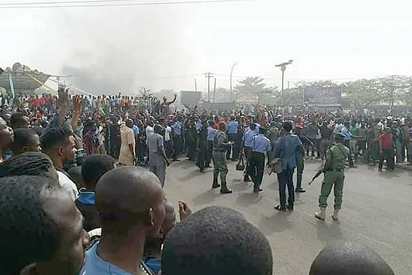Over 1,200 IDPs From South Kivu Arrive Baraka, DR Congo
The IDPs arriving Baraka are being housed in a site in Mushimbakwe where most of them sleep in the Free Methodist Church.

Over 1,200 internally displaced persons (IPDs) fleeing clashes between armed groups in Fizi territory, South Kivu of the Democratic Republic of Congo have arrived in Baraka town. The IDPs arrived on Thursday, Oct. 14.
“Those arriving are mostly women, children, and aged persons. They are coming from the villages of Magunga, Bibokoboko, Bijanda, Mugorore, Kakuku, Nyakabara, Lulimba, Mavumu and Mugorore in the Mutambala and Tangayika sectors,” David Girumukiza, chief of the Bibokoboko locality revealed.
“All the villages from which these displaced persons are coming have been burnt down by Mai-Mai rebels.” According to him, the Mai-Mai rebels started attacking villages and burning houses on Tuesday, Oct. 12.
“We all had to run away. They have extended these attacks to several villages right up to Kabembwe. The DR Congo national army, FARDC, has sent reinforcements here but they could not withstand the firepower of the Mai-Mai,” the traditional ruler said.
“That is why the entire population is running away. We are calling on the army to reinforce their troops because there are civilians who are still blocked in the bushes.”
The IDPs arriving Baraka are being housed in a site in Mushimbakwe where most of them sleep in the Free Methodist Church, a few metres from the camp of the United Nations Organisation Stabilisation Mission in the Democratic Republic of Congo (MONUSCO).
Meanwhile, Jacques Hussein Mmbucwa, the Mayor of Baraka, has called on the local population to be hospitable and direct the displaced persons to the reception sites.
“In the villages of Magunga and its environs, there have been clashes between armed groups which resulted in massive displacement of the populations towards neighbouring villages,” Mmbucwa said.
“There are displaced persons whom we have welcomed here in Baraka while others are in Lweba. This has forced me to organise a meeting of my security council to discuss how to welcome the internally displaced persons because they have no assistance and even the sites where they are hosted have problems.”
The Mayor said he has instructed quarter heads to be vigilant in the control of IDPs by first identifying them with a view to sending their dossiers on time to equally permit local authorities to direct them to the sites that have been prepared for them at the stadium and the Free Methodist Church in Baraka.
“We can for now estimate their numbers at 1,200 and we call on the population to be much more welcoming towards these brothers and sisters who are undergoing extreme suffering,” Hussein revealed.
While clashes between the Mai-Mai and Twigwaneho were going on in Kambembwe village on Oct. 15, several displaced persons were reported in Fizi villages notably in Mulima, Lumanya, Lwemba, Alenga, Kichula, Mukera and Kichanga.
Support Our Journalism
There are millions of ordinary people affected by conflict in Africa whose stories are missing in the mainstream media. HumAngle is determined to tell those challenging and under-reported stories, hoping that the people impacted by these conflicts will find the safety and security they deserve.
To ensure that we continue to provide public service coverage, we have a small favour to ask you. We want you to be part of our journalistic endeavour by contributing a token to us.
Your donation will further promote a robust, free, and independent media.
Donate HereStay Closer To The Stories That Matter




